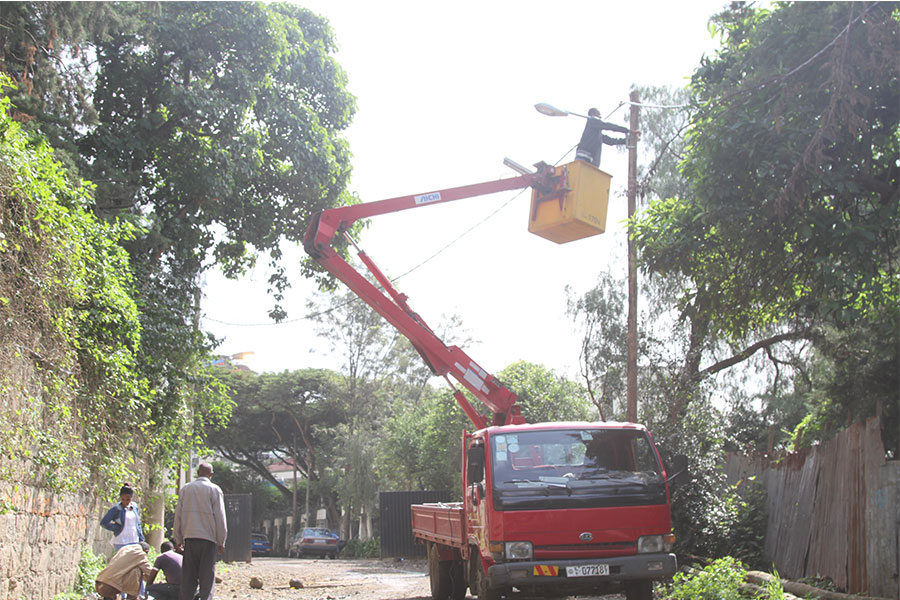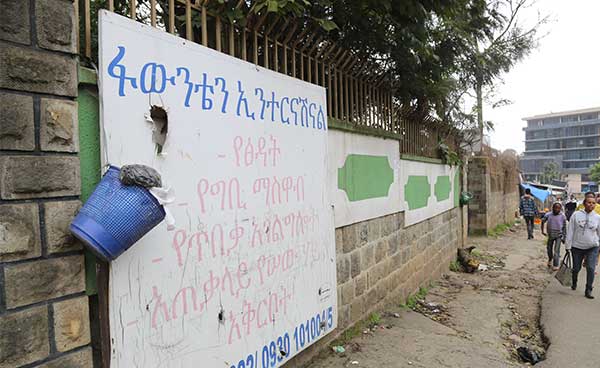
Fortune News | Aug 13,2022
Senait Abate, a young mother of 28, lives in Akaki Qality district but has been travelling to pay her utility bills at Kifiya's Lehulu branch in Qality for three days straight.
She went to the branch to pay her water and electric utility after leaving her toddler in the care of neighbours.
“I have to leave him behind, because I can’t bring him with me. Nor can I go back to tend to him, because I live too far," she said.
Senait is anxious to pay her bills before the authorities cut her services, especially the electric service.
And Senait is not alone. Many other residents of the city have experienced the difficulty of paying their utility bills at Lehulu centres.
Yehualashet Worku, a public servant who took time off from work, has been trying to pay his bills for two days. Toward the end of last month, he was standing in a long line at Lehulu's branch in La Gare.
Lehulu is a one-stop shop for various utility payments operated by Kifiya Financial Technologies, a public-private partnership (PPP) created to handle all services related to utility payments in Addis Abeba for the last seven years.
The Ministry of Innovation & Technology, which has lately been reorganized after the merger of the former Ministry of Science & Technology and the Ministry of Communication & Information Technology, is the public partner of Kifiya Financial Technology.
The PPP includes the electricity utility, Ethio telecom, Addis Abeba Water & Sewerage Authority and the Addis Abeba City Government Transport Bureau.
Every month customers including Senait and Yehualashet pay their bills at one of 32 Lehulu offices across the city. The system has created relief for the clients who have been going to each and every institution to settle their bills.
Lehulu earns 2.56 Br from each transaction and serves a combined base of around 850,000 customers using 370 employees. When the program was launched about 1.4 million customers were expected to use the service, according to the PPP.
Customers of state-run utility companies wait in long lines just to pay their bills at payments centres scattered around the city.
Lately, clients have started to experience difficulty trying to pay their bills. Long queues began to be observed at the entrance of Lehulu centres, and clients were returning to the centres day after day just to process payments.
The problem has surfaced for multiple reasons, according to Fekadu Seifu, manager of Lehulu Qality centre.
The main difficulty was that the Addis Abeba Water & Sewerage Authority (AAWSA) has not been submitting the data in a timely fashion for two to three months.
Nigusse Desalegne, communications officer at AAWSA, admits that there was a 10-day delay in transferring the bills to Lehulu, because they were updating their system.
This resulted in customers lining up to pay their electric, telephone and water bills on different days as the situation worsened. This has created chaos since the number of people who arrive to pay their bills each day has been increasing.
As new condominiums come on line and new electric and water lines are being hooked up, the customer base has also increased significantly.
"The wait is particularly heavy after 5:00pm as people come here after work to pay their bills, since we are open until 7:00pm in the evening,” said Fekadu.
Recognising this, the Qality branch has asked for additional staff to accommodate the crowd, according to Fekadu.
Though Lehulu has increased staffing, it has reduced its number of branches by two, despite the fact the PPP calls to expand to 41 branches.
The closure of the two branches coupled with the late arrival of water and sewerage payment data from AAWSA have caused the recent inconveniences, according to Ahmed Mohammed, general manager of Lehulu.
Along with Lehulu, Kifiya operates Mela, a system developed for the Ethiopian diaspora to pay bills from abroad, such as insurance and school fees in support of relatives residing in Ethiopia. Another platform Kifiya operates is, YeneGuzo, an electronic ticketing system used for cross country transport.
The Mexico branch of the company was closed after its building was demolished, while the Arada branch was closed by eviction, according to Ahmed.
The two branches were serving a large number of customers each day, averaging 12 customers in two minutes, according to Ahmed.
"Since the demolition and eviction, customers have migrated to other centres like La Gare and St. Giorgis, which have seen long lines and frustration," Ahmed told Fortune.
Samuel Teshale, a 40-year-old employee of a private company, is another client experiencing inconvenience and hassles for simply trying to pay his bills.
Two weeks ago, he was waiting in a long line in the middle of the day at the La Gare payment centre.
"Paying the utility bills may have taken 15 minutes before, but now it is taking hours and days," Samuel said.
The Ministry of Innovation & Technology has also recognised the problem, according to Tesfaye Alemnew, communications director at the Ministry.
The chaos is due to the limited number of payment centres with respect to the total number of customers in the city, according to Tesfaye.
Providing them with additional working spaces is a short solution and a difficult task to achieve, according to Tesfaye.
"The Ministry is considering a permanent solution by employing electronic payments," said Tesfaye. Involving financial institutions, the Ministry is planning to launch e-government, e-payment, e-finance and e-procurement systems, he said.
The Ministry also plans to facilitate technologies, give intellectual support, increase data connection speeds, expand telecom capacity and digitise the overall system to create an efficient and convenient payment system for the customers.
Some of the institutions have already started moving utility payment services to financial institutions. Two months ago the Ethiopian Electric Utility moved the bills of 27,000 customers to the Commercial Bank of Ethiopia (CBE) from Kifiya.
Subscribers who have already moved to the Bank’s online service are commercial customers, non-governmental organizations, governmental institutions and businesses that consume high amounts of electric power.
Ethiopian Electric Utility also plans to fully move the bills of all of the clients to CBE by the end of this fiscal year. Kifiya's agreement with the Ministry for utility payments will also expire then.
Ethio telecom has also made settlement of postpaid mobile and broadband internet service bills accessible electronically and via banks.
Commending the move of involving financial institutions in the process, Social Beyene, an IT expert and CEO at Dastech ICT Solution Plc, recommends that both private and state banks be involved in the process.
"It will make the service acceptable to all of the customers," said Social.
A good mobile banking system will also make it accessible if there is efficient ICT service, according to Social Beyene.
While contracts for utility payments edge toward being terminated, Kifiya has already started partnering with new institutions and businesses.
The latest was with St. George F.C. by automating the club's membership platform, enabling the fans to register, pay monthly membership fees, make donations, buy club outfits and other paraphernalia using a mobile application.
Two years ago, Kifiya also partnered with the Ethiopian Football Federation to automate booking and ticketing services of Yidnekachew Tessema Stadium, which is also known as Addis Abeba Stadium.
PUBLISHED ON
Mar 09,2019 [ VOL
19 , NO
984]

Fortune News | Aug 13,2022

Fortune News | Aug 06,2022

Agenda | Apr 20,2019

Radar | Jan 14,2023

Radar | Oct 02,2023

Radar | Aug 29,2020

My Opinion | Nov 21,2018

Viewpoints | Aug 21,2021

Featured | Sep 21,2019

Radar | Jul 29,2023

Feb 24 , 2024 . By MUNIR SHEMSU
Abel Yeshitila, a real estate developer with a 12-year track record, finds himself unable to sell homes in his latest venture. Despite slash...

Feb 10 , 2024 . By MUNIR SHEMSU
In his last week's address to Parliament, Prime Minister Abiy Ahmed (PhD) painted a picture of an economy...

Jan 7 , 2024
In the realm of international finance and diplomacy, few cities hold the distinction that Addis Abeba doe...

Sep 30 , 2023 . By AKSAH ITALO
On a chilly morning outside Ke'Geberew Market, Yeshi Chane, a 35-year-old mother cradling her seven-month-old baby, stands amidst the throng...

Apr 20 , 2024
In a departure from its traditionally opaque practices, the National Bank of Ethiopia...

Apr 13 , 2024
In the hushed corridors of the legislative house on Lorenzo Te'azaz Road (Arat Kilo)...

Apr 6 , 2024
In a rather unsettling turn of events, the state-owned Commercial Bank of Ethiopia (C...

Mar 30 , 2024
Ethiopian authorities find themselves at a crossroads in the shadow of a global econo...